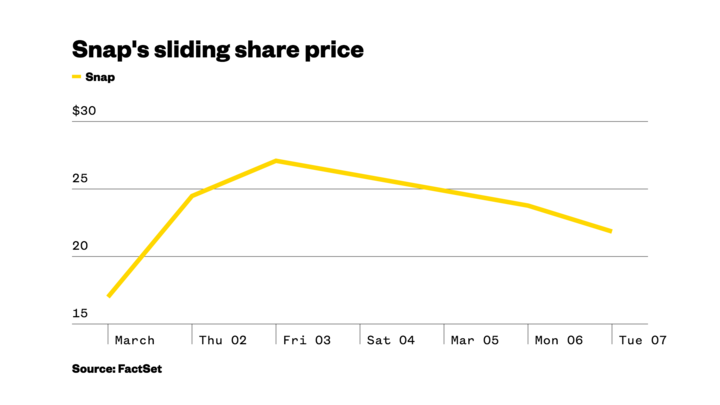Snapchat co-founders Bobby Murphy, left, and CEO Evan Spiegel, ring the opening bell at the New York Stock Exchange while Thomas Farley, right, president of the Exchange, cheers on the crowd, as the company celebrates its IPO, Thursday, March 2, 2017. (AP Photo/Richard Drew)
It only took two days of trading before Wall Street decided that Snap’s stock was overvalued at the time of its first day of trading. After opening at $24.47 on Thursday and peaking at $28.84 on Friday, Snap stock began trading just above $22 a share on Tuesday morning.That’s still 29 percent above the IPO price of $17, enjoyed by big financial institutions, but 10 percent lower than the opening-day price paid by the investing public.Given that Snapchat has never turned a profit, lost $515 million in 2016, and said in a public filing last month that it “may never be profitable,” its share price was bound to come back to earth. And if you were concerned about how Snap’s stock slide over the past two days might affect 26-year-old CEO Evan Spiegel’s net worth, rest assured that he’s still a multibillionaire. Outside of the initial hype cheering on the IPO, the response from investors and analysts to the Snap’s stock market debut has been mixed. Although people largely agree that Spiegel is a talented executive with a knack for product development, Snap’s corporate structure and business plan raise red flags.Regulators are looking into whether Snap’s stock structure — which gives shareholders no voting rights whatsoever — could incentivize other “unicorn” tech companies to do the same. And given that the heart of Snap’s business is selling digital ads, slowing Snapchat user growth suggests that turning Snapchat into a moneymaker will be a serious challenge.Spiegel and Snap, meanwhile, have largely declined to address a lot of these concerns directly, instead opting to just tell people to sit tight and watch what happens over the next half-decade. In an interview with the Los Angeles Times on the day of the IPO, Spiegel said, “We’re going to have to go through an education process for the next five years to explain to people how our users and that creativity creates value.”
Outside of the initial hype cheering on the IPO, the response from investors and analysts to the Snap’s stock market debut has been mixed. Although people largely agree that Spiegel is a talented executive with a knack for product development, Snap’s corporate structure and business plan raise red flags.Regulators are looking into whether Snap’s stock structure — which gives shareholders no voting rights whatsoever — could incentivize other “unicorn” tech companies to do the same. And given that the heart of Snap’s business is selling digital ads, slowing Snapchat user growth suggests that turning Snapchat into a moneymaker will be a serious challenge.Spiegel and Snap, meanwhile, have largely declined to address a lot of these concerns directly, instead opting to just tell people to sit tight and watch what happens over the next half-decade. In an interview with the Los Angeles Times on the day of the IPO, Spiegel said, “We’re going to have to go through an education process for the next five years to explain to people how our users and that creativity creates value.”
Advertisement
